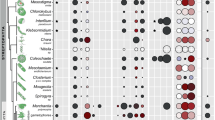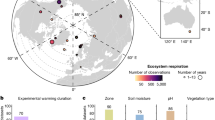Abstract
THE accurate determination of the radioactivity of stock sodium carbonate solutions and the correction of the radioactivity of membrane filtered algae to zero thickness are two of the greatest barriers to accurate productivity measurements using carbon-14.
This is a preview of subscription content, access via your institution
Access options
Subscribe to this journal
Receive 51 print issues and online access
$199.00 per year
only $3.90 per issue
Buy this article
- Purchase on Springer Link
- Instant access to full article PDF
Prices may be subject to local taxes which are calculated during checkout
Similar content being viewed by others
References
Goldman, C. R., Ecol. Monogr., 30, 207 (1960).
Goldman, C. R., Proc. Conf. on Primary Productivity Measurement, Marine and Freshwater, edit. by Doty, M. S., 103 (Publ. TID-7633. U.S. Atomic Energy Commission, Div. of Technical Information, 1961).
Jitts, H. E., and Scott, B. D., Limnol. and Oceanog., 6, 116 (1961).
Hayes, F. N., Packard, Tech. Bull., No.1, 1 (Packard Instrument Co., Inc., La Grange, Illinois, 1963).
Author information
Authors and Affiliations
Rights and permissions
About this article
Cite this article
SCHINDLER, D. A Liquid Scintillation Method for measuring Carbon-14 Uptake in Photosynthesis. Nature 211, 844–845 (1966). https://doi.org/10.1038/211844a0
Issue Date:
DOI: https://doi.org/10.1038/211844a0
This article is cited by
-
A uranyl based coordination polymer showing response to low-dosage ionizing radiations down to 10−5 Gy
Science China Chemistry (2020)
-
The effects of Anabaena flos-aquae inoculation, pH elevation, and N/P manipulation on the algal biomass and species composition of an acid lake
Hydrobiologia (1990)
-
The effects ofAnabaena flos-aquae inoculation, pH elevation, and N/P manipulation on the algal biomass and species composition of an acid lake
Hydrobiologia (1990)
-
Facteurs contrôlant la production primaire dens deux rivières soumises a une forte réduction de débit
Hydrobiologia (1987)
-
Preparation of 14C-labeled algal samples for liquid scintillation counting
Hydrobiologia (1983)
Comments
By submitting a comment you agree to abide by our Terms and Community Guidelines. If you find something abusive or that does not comply with our terms or guidelines please flag it as inappropriate.



